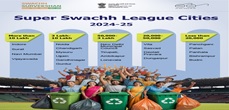23 February, 2026
Swachh Survekshan Awards 2024–25
Fri 18 Jul, 2025
Reference:
President Smt. Droupadi Murmu presented the Swachh Survekshan Awards 2024–25 on 17th July 2025.
Key Highlights:
- Organized by: Ministry of Housing and Urban Affairs (MoHUA)
- World’s largest urban cleanliness survey
- Theme: "Reduce, Reuse, and Recycle", focusing on waste management and sustainable sanitation
- Assessment: Over 4,500 cities evaluated on 10 parameters and 54 indicators
- Total Awards: 78, across 4 different categories
- Certification: Garbage-Free City (GFC) rating from 1-star to 7-star (7-star being the highest)
- Citizen Participation: Public feedback was a major component (via Swachhata apps and helplines)
Main Categories:
- Super Swachh League (Population-based)
- Special Category (Ganga cities, Cantonment boards, etc.)
- State-Level Awards
- Safaimitra Suraksha & Jan Bhagidari Awards
Super Swachh League (By Population):
| S. No. | Population Category | State | City |
| 1. | More than 10 Lakh | Madhya Pradesh | Indore |
| 2. | Gujarat | Surat | |
| 3. | Maharashtra | Navi Mumbai | |
| 4. | Andhra Pradesh | Vijayawada | |
| 5. | 3–10 Lakh | Uttar Pradesh | Noida |
| 6. | Chandigarh | Chandigarh | |
| 7. | Karnataka | Mysuru | |
| 8. | Madhya Pradesh | Ujjain | |
| 9. | Gujarat | Gandhinagar | |
| 10. | Andhra Pradesh | Guntur | |
| 11. | 50,000–3 Lakh | Delhi | New Delhi (NDMC) |
| 12. | Andhra Pradesh | Tirupati | |
| 13. | Chhattisgarh | Ambikapur | |
| 14. | Maharashtra | Lonavala | |
| 15. | 20,000–50,000 | Maharashtra | Vita |
| 16. | Maharashtra | Saswad | |
| 17. | Maharashtra | Deoli Pravara | |
| 18. | Rajasthan | Dungarpur | |
| 19. | Less than 20,000 | Maharashtra | Panchgani |
| 20. | Chhattisgarh | Patan | |
| 21. | Maharashtra | Panhala | |
| 22. | Chhattisgarh | Bishrampur | |
| 23. | Madhya Pradesh | Budhni |
Top Cleanest Cities (Population Over 10 Lakh):
| Rank | City | State | Remarks |
| 1st | Ahmedabad | Gujarat | 7-star GFC; noted for innovations in waste reduction and recycling |
| 2nd | Bhopal | Madhya Pradesh | Improved sanitation infrastructure and solid waste management |
| 3rd | Lucknow | Uttar Pradesh | First UP city with 7-star GFC; progress in dump remediation and citizen involvement |
Top Clean Ganga City:
- 1st: Prayagraj (UP) – Honored for innovative sanitation during Mahakumbh 2025 preparations
- Other notable mentions: Varanasi and Haridwar for sanitation and waste management along the Ganga
Cleanest States:
- 1st: Uttar Pradesh
-
- Outperformed national average in key indicators (Service Level Progress, Certification, and Citizen Voice)
- Major focus on dump remediation and waste processing under CM Yogi Adityanath’s initiatives
- 2nd: Gujarat
-
- Scored 8178/12500
- Strong performance by cities like Surat, Ahmedabad, Vadodara, and Gandhinagar
Special Category Awards:
| Award Title | City/State | Remarks |
| Swachh Mahakumbh 2025 Award | Uttar Pradesh | For sustainable sanitation efforts during Mahakumbh |
| Safaimitra Surakshit City | Gorakhpur (UP) | 3rd position – for worker safety and welfare |
| Emerging Clean City | Agra (UP) | Recognized for remarkable sanitation progress |
| Promising Clean City | Vadodara (Gujarat) | |
| Best Capital City | Chandigarh | Excellent solid waste management |
Other Notable Achievements:
- Kanpur (UP): Entered Water Plus category for the first time; ranked 13th among cities with 10 lakh+ population
- Noida (UP): 2nd place in 3–10 lakh population category; received 5-star GFC rating
- Gandhinagar (Gujarat): Featured in Super Swachh League; strong in sanitation and public awareness
Swachh Survekshan – General Overview:
- Launched by: Government of India
- World’s largest urban cleanliness survey
- Objective: Assess sanitation status across urban India and promote active citizen participation
- Inception: First launched in 2016 under Swachh Bharat Mission (Urban), which began on 2 October 2014
- Conducted by: Ministry of Housing and Urban Affairs in partnership with Quality Council of India (QCI)
Key Assessment Criteria:
- Waste segregation at source
- Management of wet and dry waste
- ODF (Open Defecation Free) status
- Safety of sanitation workers
- Plastic waste management and recycling


















